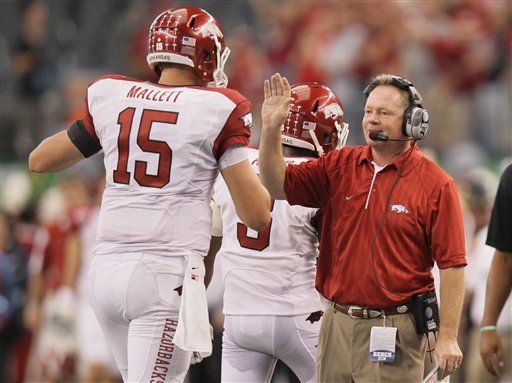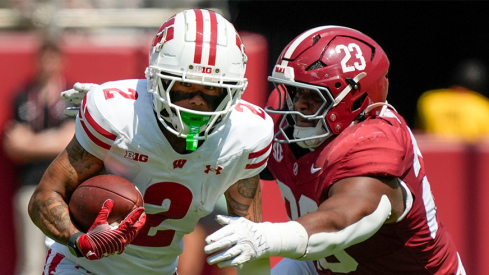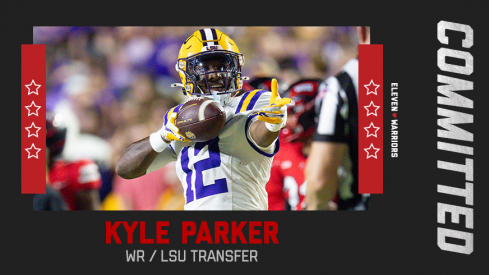
When the University of Arkansas hired Bobby Petrino in the wake of Houston Nutt's tumultuous departure, it's doubtful that either Hog fans or the AD themselves knew exactly what they were getting. Here's a coach who inherited a solid-if-unspectacular Louisville program from John L. Smith in the wake of the latter's departure to Michigan State, and turned the Cardinals from an upper-tier C-USA team to a BCS bowl winning Big East outfit in a matter of years. But here also was the coach who had bailed on his first shot at the big time, failing to complete a full season as head coach of the Atlanta Falcons, to take the job in Fayetteville. How did he inform the players who had toiled under him for 13 games in Atlanta? With no more than a note in the locker room.
It was under such mixed auspices that Petrino inherited a program whose greatest recent success had been an upset over title-bound LSU just a year prior. But Darren McFadden and Felix Jones were both gone, leaving perpetually overmatched Casey Dick - and occasionally, younger brother Nathan - as the showrunner(s) in one of the most complex, pro-style offenses in the entire country. Predictably, Petrino's first season did not go well: the Hogs finished 5-7, 2nd in the conference in passing offense but 10th in rushing and dead last in total defense.
In 2009, that was all supposed to change. Gone were the Dicks (last time, I promise), and arriving was Ryan Mallett, a lead-footed, howitzer-armed pocket passer; a disgruntled transfer from Michigan's new experiment with the spread-option offense. Mallett was a perfect fit for the system, tossing 30 touchdowns to just 7 picks in his first year as a starter. Despite that success, the Hogs still finished with a meager 8 wins. Yet again, the lack of a consistent running game and anything resembling a defense had submarined Arkansas' hopes of competing for an SEC title: the Hogs finished 10th in the SEC in rushing offense again, and dead last in total defense. Again.
Petrino and the team had experienced some success, but 2010 needed to be a big leap forward for the entire program to instill confidence in its stability among fans and to remove the doubt clogging many outsiders' minds.
With Ryan Mallett and the majority of the best skill position players back, expectations were high for the Razorbacks in the preseason. They opened the season with three wins, two over patsies, the third a last-second thriller at Georgia, pushing the Hogs into the top-10 in the national polls. Following the emotional win in Athens, the Hogs hosted what some considered to be a season-defining tilt against the defending national champion Alabama Crimson Tide. Things went well for Bobby Petrino's team in the early going, with Ryan Mallet hitting a wide-open Ronnie Wingo on a 43-yard scoring toss 50 seconds into the game. It wasn't pretty, but the Hogs built a 20-7 lead and held it into well in the third quarter. Then it all fell apart. Trent Richardson's touchdown grab with :44 left in the third brought the Tide within six, and a Bama field goal in the fourth made it a tenuous 20-17 Arkansas lead. Mallett didn't respond well under pressure for the first time all season, tossing his second pick of the day to Bama safety Robert Lester, which set up the go-ahead Tide touchdown. With the opportunity to snatch glory from the jaws of defeat in the game's waning moments, the junior signal caller threw his third and final pick of the day to seal the Bama win.
It's not like Mallett was the goat. He was the bulk of the team's offense, throwing 38 times for 357 yards and getting just 64 yards from his cobbled-together ground game. But the Hogs still sat at 3-1 with dates looming against Texas A+M and streaking Auburn and frustration already mounting, having squandered away their first chance to grab the SEC west's spot in the SEC championship game by the throat. The Hogs took care of business against the Aggies, and headed into the road date at Auburn with a 4-1 record.
Mallett looked fine in the opening moments at Jordan-Hare Stadium, calmly directing the Arkansas offense down the field to take a 7-0 lead. But after suffering a concussion later in the half, he had to watch from the sidelines as back-up Tyler Wilson went toe-to-toe with the Tigers for three quarters. The Hogs even held a 43-37 lead with 14 minutes left in the fourth. It was then that Cam Newton and Auburn put the foot on Arkansas' neck, scoring 28 unanswered points to close the game. Arkansas' SEC West title hopes were more or less dead in the water. With nothing to play for, some teams might have gone in the tank.
But Arkansas responded rather well: after getting a couple breathers against Ole Miss and Vanderbilt that allowed the running game to find its feet, Mallett and company traveled to Columbia, South Carolina, looking to unleash newly-discovered weapon Knile Davis on the SEC's #1 rushing defense. And unleash him they did: Davis toted the rock 22 times for 110 yards and 3 touchdowns, the best game on the ground that any single non-Cam Newton player had had all season against Ellis Johnson's defense. Davis' success in part was aided by the fact that Mallett had little trouble moving the ball through the air against the SEC's worst passing defense: he finished 21 of 30 for 1 touchdown and 302 yards, his lone mistake being a meaningless pick in a 41-20 trouncing of the Gamecocks. One other black mark on the game: Greg Childs, the team's leading receiver, tore a patellar tendon and was out for the remainder of the season.
The Hogs got another week off against UTEP before traveling to Starkville to take on an improved Mississippi State team. Mallett was more or less a cyborg in decimating the Bulldog defense, completing 17 of 26 passes for 305 yards and three scores in a double-overtime 38-31 win. He finished the day with his second best yards/attempt average while Knile Davis ran wild, carrying the rock 30 times for 187 yards and a pair of touchdowns. The Hogs were on the precipice of 10 wins, a mark they hadn't matched since Darren McFadden's breakout season in 2006.
They would have to get that tenth win the next week against rival LSU. The streaking Tigers entered the game at 10-1, ranked 6th in the country and three weeks removed from a seemingly season-defining win over the Alabama Crimson Tide. The two teams played an even first half until two LSU defenders collided in coverage at the end of the 2nd quarter allowing Arkansas' Cobi Hamilton to take a Mallett pass 80 yards to put the Razorbacks up 21-14 at the break:
LSU battled back with a pair of 3rd-quarter field goals to close the gap to 21-20, but couldn't muster enough offense for the comeback after the Hogs increased their lead to 31-20 with 6 minutes left in the fourth. Mallett wasn't perfect in the 31-23 win, finishing with 320 yards, three touchdowns and a pair of picks. The Tigers didn't have an answer for Knile Davis either, as the emerging star racked up 157 yards on another 30-carry day, completing what might be the ideal offensive effort for a Bobby Petrino-coached team.
So what turned Arkansas from a 4-2 BCS also-ran into a BONA FIDE BCS BOWL team?
The emergence of Knile Davis was undeniably one of two key developments. You've seen the statistics. In Arkansas' two losses, the team averaged 101 yards rushing; a number skewed by a pretty good day (138 yards) against Auburn but still a good 50 yards below the national average. They were held under 100 yards rushing three times in their first four games. With Davis in the backfield, the Hogs gashed South Carolina, moved the ball at will against a solid LSU defense, and sliced through almost everyone else on their post-Auburn schedule with ease.
But that's only half the story; the other half was the emergence of the rushing defense: while Knile Davis was tearing up the Gamecock defense, the Arkansas D made life a living hell for prodigal South Carolina freshman Marcus Lattimore, who finished the day with 11 carries for 30 yards. Mississippi's spread-option attack needed 42 carries to get to 185 yards, and Mississippi State's needed 70 (!) to get to 262, a big number, but still under 4 yards a pop. LSU was simply shut down on the ground.
So yeah, the rushing defense isn't putting up '09 Bama or '08 USC numbers. Moving beyond raw total defense numbers, Football Outsiders ranks them as the 26th overall defense in the country, and the fifth toughest the Buckeyes have played after Miami, Illinois, Iowa and Wisconsin. It's better than it has been in years prior, and was good enough to get Arkansas over the hump in the SEC, giving them their best season since the glory days of McFadden and Jones. Most importantly, it has crushed teams like LSU and South Carolina which came into the game thinking they could simply run the ball to take pressure off of their inconsistent passers. Still, it can be had, as Alabama and Auburn showed, and that's encouraging. Even so, Pryor is going to have to make plays with his arm to give the Buckeye offense a chance of keeping pace with the Hogs. In the end, Razorback defense's continued improvement, along with the arrival of Knile Davis and the continued excellent play of Mallett make Arkansas a dangerous bowl opponent, and a thoroughly worthy one that, which will provide a great litmus test for this edition of the Buckeyes.

